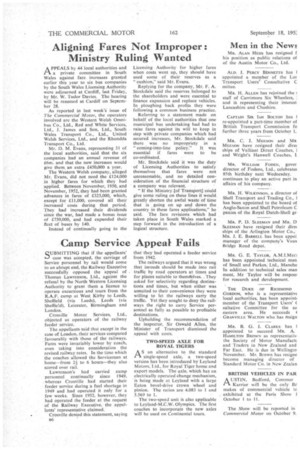Camp Service Appeal Fails
Page 40

If you've noticed an error in this article please click here to report it so we can fix it.
SUBM1TTING that if the appellants' case was accepted, the carriage of Service personnel by rail would come to an abrupt end, the Railway Executive successfully opposed the appeal of Thomas Lawrenson, Ltd., against the refusal by the North Western Licensing Authority to grant them a licence to operate excursions and tours from the R.A.F. camp at West Kirby to Leeds, Sheffield (via Leeds), Leeds (via Sheffield), Leicester, Birmingham and London.
Crosville Motor Services, Ltd., objected as operators of the railway feeder service.
The appellants said that except in the case of London, their services compared favourably with those of the railways. Fares were invariably lower by coach, even taking into consideration the revised railway rates. In the time which the coaches allowed the Serviceman at home—from 21 to 6 hours—they also scored over rail.
Lawrenson's had carried camp personnel continually since 1949, . whereas Crosville had started their feeder service during a fuel shortage in 1949 and had operated it only for a few weeks. Since 1952, however, they had operated the feeder at the request of the Railway Executive, the appellants' representative claimed.
Crosville denied this statement, saying n6 that they had operated a feeder service from 1942.
The railways argued that it was wrong that inroads should be made into rail traffic by road operators at times and for places suitable to themrelves. , They asked for selectivity regarding destinations and times, but when either was unsuited to their convenience they were willing to let the railways carry the traffic. Yet they sought to deny the railways the right to carry Service personnel as fully as possible to profitable destinations.
Upholding the recommendation of the inspector, Sir Oswald Allen, the Minister of Transport dismissed the appeal with costs.
TWO-SPEED AXLE FOR ROYAL TIGERS
A S an alternative to the standard P't single-speed axle, a two-speed version has been introduced by Leyland Motors, Ltd., for Royal Tiger home and export models. The axle, which has an electrically operated change mechanism, is being made at Leyland with a large Eaton bevel-drive crown wheel and pinion. The ratios are 4.083 to 1 and 5.569 to I.
The two-speed unit is also applicable to Leyland-M.C.W. Olympics. The first coaches to incorporate the new axles will be used on Continental tours.




































































































